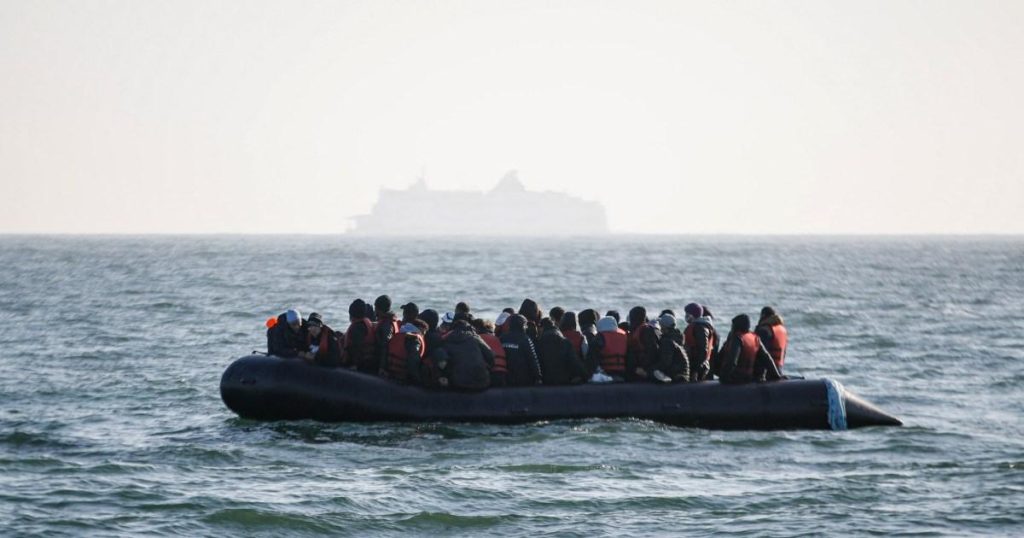The English Channel, one of the world’s busiest shipping lanes, witnessed a tragic start to 2025 as a 19-year-old Syrian man lost his life during a perilous small boat crossing. The overcrowded and leaking vessel, carrying approximately 60 individuals, departed from the French coast near Calais in the early hours of Saturday morning. Amidst the chaos of the sinking boat, with people being thrown overboard, the young man was tragically crushed, likely by the weight of fellow passengers struggling to stay afloat. This marks the first recorded death of the year in the Channel, a grim reminder of the persistent dangers associated with these crossings.
The incident underscores the inherent risks posed by the combination of overcrowded boats, treacherous sea conditions, and the sheer volume of maritime traffic in the Channel. The flimsy vessel, ill-equipped to handle the journey and the number of passengers onboard, began taking on water shortly after departure, leading to panic and disarray. The chaotic scene unfolded as around 30 people were forced into the frigid waters, highlighting the desperate measures taken by those seeking refuge and a better life. Upon interception by authorities, the grim discovery of the young man’s lifeless body was made, a stark illustration of the human cost of these perilous journeys.
The rescue operation, involving a helicopter, coast guard vessel, and a fishing trawler, managed to retrieve 35 survivors who were returned to Boulogne-sur-Mer. A teenager among the rescued required hospitalization, while two individuals have been arrested in connection with the incident. The UK government expressed condolences and reiterated its commitment to deterring these dangerous crossings, highlighting the exploitation of vulnerable individuals by criminal networks who prioritize profit over human safety. This tragedy echoes previous incidents where lives were lost due to overcrowding, highlighting the urgent need for comprehensive solutions to address the root causes of these perilous journeys.
The Channel crossings, a recurring theme in recent years, have claimed numerous lives, with 2024 recording 77 fatalities, the highest number since records began in 2018. The tragic circumstances surrounding these deaths range from drowning to succumbing to the cramped and often inhumane conditions on the overcrowded vessels. Past incidents include the heartbreaking death of a four-year-old child who was trampled in the crush of people on a sinking boat in October 2024, and the harrowing rescue of a 10-month-old baby from a boat that was torn apart on rocks, an incident that claimed the lives of eight others, some of whom were crushed to death. These tragic events underscore the vulnerability of children and families undertaking these perilous journeys, often driven by desperation and the hope for a safer future.
Despite the inherent dangers, the number of individuals attempting the crossing remains significant. While 2024 saw a slight decrease from the record-high numbers of 2022, over 36,800 people still risked their lives in small boats, a testament to the desperation driving these journeys. The recent meeting between UK Prime Minister Keir Starmer and French President Emmanuel Macron highlights the ongoing dialogue and cooperation between the two nations in addressing this complex issue. The discussion underscores the need for collaborative efforts to tackle the root causes of migration, disrupt criminal networks facilitating these crossings, and ensure the safety and well-being of those seeking refuge.
The tragic loss of the young Syrian man serves as a sobering reminder of the human cost of the ongoing migrant crisis and the desperate measures taken by individuals seeking a better life. The incident highlights the urgent need for international cooperation and comprehensive solutions to address the root causes of migration, dismantle the criminal networks profiting from human desperation, and provide safe and legal pathways for those seeking refuge. The focus must shift from reactive measures to proactive strategies that prioritize human dignity and prevent further tragedies from unfolding in the perilous waters of the English Channel.











